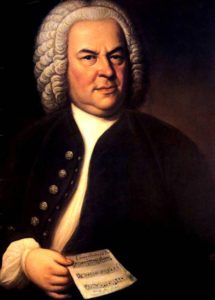Commemoration of Johann Sebastian Bach, Kantor
July 28
The Lord be with you
 July 28 is the anniversary of the death of Johann Sebastian Bach (1685-1750) and the date he is commemorated on our calendar. Born in Eisenach and orphaned at the age of ten, Bach was mostly self-taught in music. He was a highly skilled violinist and organist, and a brilliant composer. His professional life as conductor, performer, composer, teacher, and organ consultant began at age nineteen in the town of Arnstadt and ended in Leipzig, where for the last twenty-seven years of his life he was responsible for all the music in the city’s four Lutheran churches.
July 28 is the anniversary of the death of Johann Sebastian Bach (1685-1750) and the date he is commemorated on our calendar. Born in Eisenach and orphaned at the age of ten, Bach was mostly self-taught in music. He was a highly skilled violinist and organist, and a brilliant composer. His professional life as conductor, performer, composer, teacher, and organ consultant began at age nineteen in the town of Arnstadt and ended in Leipzig, where for the last twenty-seven years of his life he was responsible for all the music in the city’s four Lutheran churches.
Although his musical compositions are overwhelming, during his lifetime Bach was known much more for his playing skills. After his death, his compositions were ignored. They were seen as “old fashioned” compared to the new classical style. This, even though the great composers of the classical age all seemed to recognize Bach’s genius. Still, the compositions of Bach had to wait until the 19th century to get much recognition. Felix Mendelssohn was one to the key reasons for the revival of interest in Bach. Before he gave a concert, instead of practicing the pieces he would be performing, he would play Bach. When asked why, Mendelssohn said, “If you can play Bach, you can play anything.” Today Bach is recognized as one of the greatest composers of all time.
One of the outstanding features of Bach was how he kept his Christian Faith front and center in his life. He was a devoted Lutheran. In his day and age, orthodox Lutheranism was under attack by those who sought to compromise with Reformed theology or the current cultural trend called “the Enlightenment.” Bach’s music filled the churches and so was a major force in keeping the Church focused on Christ. His influence was so pervasive that Archbishop Nathan Söderblom called him “the fifth evangelist.” So that he could write excellent words to his music, Bach read the commentaries of the great Lutheran theologian, Abraham Calov. We still have Bach’s copies of Calov’s commentaries with Bach’s notes indicating which thoughts would make excellent musical compositions. It is no surprise that Bach insisted that all his music was for the glory of God and for the life of the Church.
Bach married twice. His first wife was Maria Barbara Bach (a distant cousin). She died in 1720. A year later, he married Anna Magdalena Wülcken. Bach had twenty children, nine who survived him and four who had significant musical careers.
Prayer: Almighty God, beautiful in majesty and majestic in holiness, You have taught us in Holy Scripture to sing Your praises and have given to Your servant Johann Sebastian Bach grace to show forth Your glory in his music. Continue to grant this gift of inspiration to all Your servants who write and make music for Your people, that with joy we on earth may glimpse Your beauty and at length know the inexhaustible richness of Your new creation in Jesus Christ, our Lord, who lives and reigns with You and the Holy Spirit, one God, now and forever. Amen.
Appropriate prayers include:
• For all who make music for the church
• For a renewed appreciation of music as a gift from God
• For God to raise up new musicians for the church and his people
• For the worship life of the church
Blessings in Christ,
Pastor John Rickert
